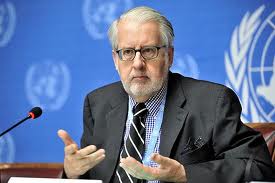
A growing number of people in the escalating violence in Syria appear to be targeted because of their religion and "gross violations of human rights are occurring regularly," a U.N. monitor said on 27 June.
The 16-month-old conflict between insurgents and forces defending President Bashar al-Assad's government is also becoming "increasingly militarized," said Paulo Pinheiro, chair of the Independent Commission of Inquiry on Syria, in a report presented to the U.N. Human Rights Council in Geneva. An estimated 15,000 people have been killed in the conflict. "Where previously victims were targeted on the basis of their being pro- or anti-government, the Commission of Inquiry has recorded a growing number of incidents where victims appear to have been targeted because of their religious affiliation," said the report.
Several branches of Islam are involved in the conflict. The minority Alawite sect, a branch of Shia Islam, comprises only 12 percent of the country's population but is strongly represented in the armed forces and forms the power base for al-Assad's government.
A soldier with the Free Syrian Army (FSA), an armed opposition group supported by Sunni Muslims, told the commission that "Alawite soldiers are normally killed immediately upon capture, while soldiers from other sects are offered the chance to join the FSA, and if they refuse they are released to their relatives." About 75 percent of the population is Sunni.
The commission report also noted that "an armed group has occupied a Greek-Catholic church in Al Qusayr, Homs, attacking clergy and turning the building into a base for its operations."
Pinheiro, who visited the Syrian capital of Damascus from 23-25 June, warned that as a result of the flow of new weapons and ammunitions both to government and to anti-government armed groups, "the situation risks becoming aggravated in the coming months."
In a bid to stop the violence, the U.N.'s special envoy on Syria, Kofi Annan, has invited the foreign ministers of the U.S., Russia, China, the U.K., France, Turkey, Iraq, Qatar, Kuwait, and U.N. Secretary General Ban Ki-moon to a meeting on 30 June in Geneva. The meeting will examine a stalled peace plan put forward by Annan. On 25 June, the Rev. Olav Fykse Tveit, general secretary of the Geneva-based World Council of Churches, wrote to Ban, requesting that the U.N. give "a stronger and clearer mandate" to Annan's initiative. "It is only through an inclusive multi-lateral negotiated peace process that the worst can be avoided in Syria," Tveit said.
John Zarocostas
